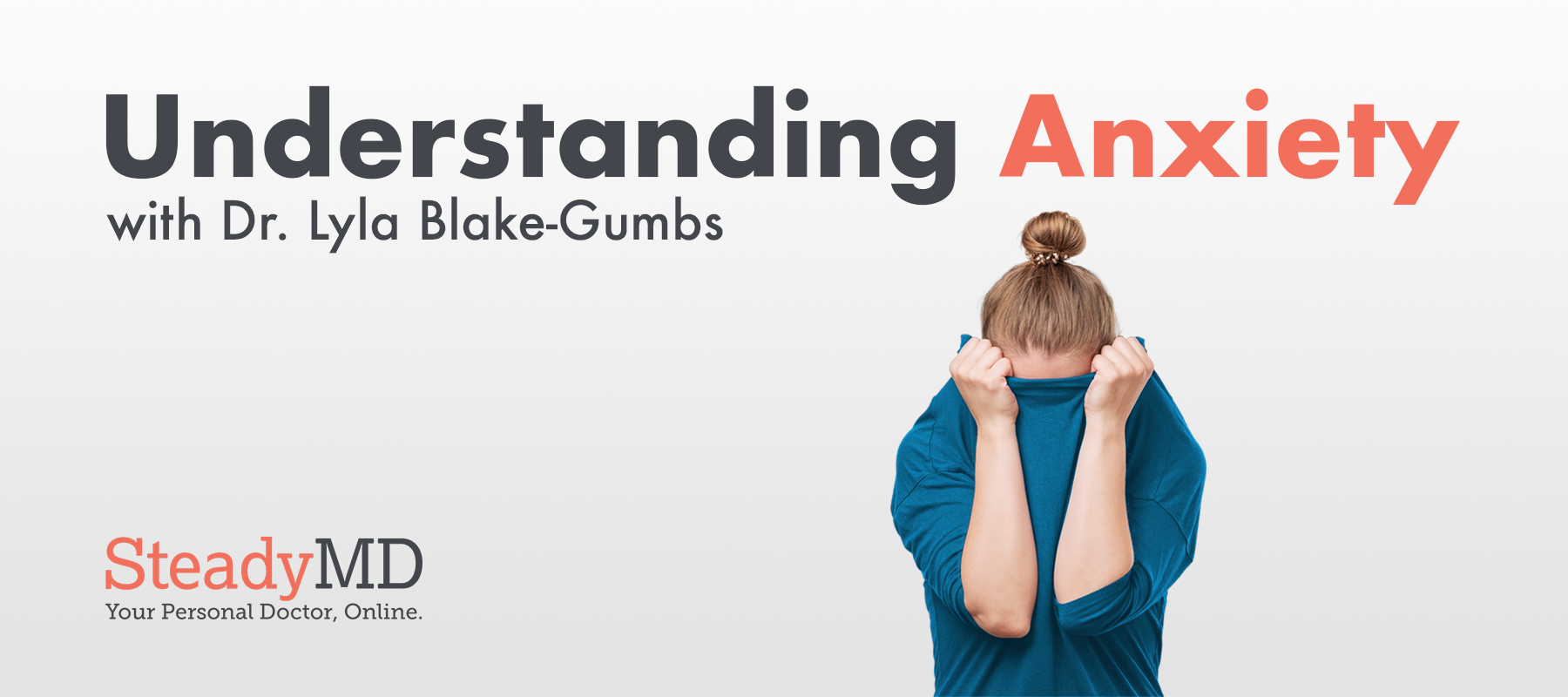There’s a wide range in the presentations of people who come in with anxiety. That’s why we asked SteadyMD Dr. Lyla Blake-Gumbs, your most pressing questions about the causes, symptoms, and treatment of anxiety.
Dr. Lyla Blake-Gumbs, M.D. is a board-certified family physician with 22 years of clinical experience. She offers a functional approach to her patients’ care by investigating the root cause of her patients’ symptoms. Here’s what she had to say about anxiety:
What is Anxiety?
Anxiety, the most common group of mental illness in the US affecting about 40 million people, is a condition characterized by excessive worry or fear and is often accompanied by physical sensations of heart-racing/palpitations, sweating, shortness of breath.
Understanding its Root Cause
Genetics, family background, brain chemistry, lifestyle and life experiences (like a history of early life trauma) and social influences can all contribute to varying degrees to development of anxiety.
The root cause is typically a disruption in the amounts of various neurotransmitters, or chemical messengers, within the nervous system. While this can often be managed with medications which help regulate the amounts of certain neurotransmitters such as serotonin and norepinephrine, there are also behavioral treatments that can be tried first.
Symptoms
Some people are more prone to experience symptoms of anxiety either with or without known triggers such as being faced with a public speaking event or a musical/sports performance.
Different people will experience anxiety in their own unique way. For some, it may just feel like “butterflies,” whereas others may feel a severe sense of impending doom, nausea or even dizziness or lightheadedness.
Aside from caffeine, which is a frequent trigger, recreational drugs, social situations, work or relationship stressors can all be triggers for anxiety. That being said, many individuals can experience anxiety with no recognizable triggers.
Is My Anxiety Acute or Chronic?
Acute anxiety is typically defined by symptoms that might occur situationally and last very briefly, even if they occur with frequency.
Generalized anxiety (what some might call “chronic anxiety”) must occur more days than not for at least 6 months according to the Diagnostic and Statistical Manual of Mental Disorders, 5th Edition (commonly referred to as DSM-5).
Diagnosing Anxiety
First, I attempt to ascertain how much the symptoms are impairing a person and with what frequency. The DSM-5 lists 6 subtypes of anxiety, each of which may require a different approach.
There are, of course, varying levels of severity of symptoms even within the same individual depending on the circumstances, stressors, etc. There are multiple approaches to treatment including, but not limited to, cognitive behavioral therapy, exercise, medications, getting adequate sleep, stress reduction techniques such as meditation and avoidance of substances known to contribute to anxiety, such as caffeine and stimulant drugs.
What are the Related Conditions Associated with Anxiety?
Untreated hyperthyroidism can often be present with anxiety, as can various heart conditions including heart disease, diabetes, respiratory diseases such as asthma or chronic obstructive pulmonary disease (COPD).
Anxiety, if it impairs day to day function, can lead to these types of severe situations. Often associated with depression, anxiety can result in an inability to continue to function at the level necessary within one’s personal, social, or work spheres which would be an indication that immediate treatment is warranted, with a combination of psychotherapy, medication(s), and lifestyle changes.
Treatment:
In most cases, combining treatment modalities is a better option than just medication alone. The ‘take-home’ message should be that anxiety, when it interferes with your life, can take on a life of its own: sometimes where a person becomes anxious about the anxiety itself.
When this happens, or if specific impairments limit one’s activities or relationships or employment, they should immediately seek help as it is a treatable condition.
